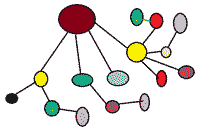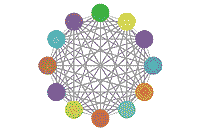
Decentralization
Why is decentralization a key principle of system design?
The flaws of centralized power were made all too clear during the Soviet experiment with statist socialism, in which the maintenance of a central authority, for the sake of central authority, was pursued at tremendous human cost. Less dramatically, there is ample evidence to suggest that centralized government enterprises tends to become bureaucratic institutions with little public input or control. Additionally, modern economic theory since, but not limited to, the work of Hayek suggests that attempting to effectively control a complex system entirely through a centralized apparatus may be infeasible on a purely technical level, even allowing for modern computer technologies, and regardless of our particular political commitments.
Furthermore, many studies suggest that scale is also an important, indeed, fundamental consideration. Robert Dahl and Edward Tufte, for instance, have asked "how large should a political system be in order to facilitate rational control by its citizens?" The United States - with over 300 million people spread across a continent - is almost certainly too big to be meaningfully participatory and democratic. Aristotle thought the maximum for a State was about 20,000. Jefferson favored devolution down to the ward level. How could so large a nation possibly involve citizens in critical decisions? By devolving, getting out of the way, and setting the market free. Laissez faire, laissez passez. As Hayek said, the emergent market works better than top-down planning. Sooner or later, a profound decentralization of the statist system - to the neighborhood, community, household, or individual level - is highly likely.
What are the limits of decentralization?
Even though decentralization is appealingly in accord with our ethical intuitions about freedom, we should avoid treating it as an unquestionable good in all situations. The principle of “subsidiarity,” as noted, with its roots in Catholic social thought, may be helpful here - the idea being that decentralized, small-scale solutions, should as far as possible be a default option - in the absence of a compelling argument to the contrary in favor of a more centralized or larger scale solution. E.F. Schumacher substantially concurs in his book, Small is Beautiful, which is often regarded as something of a bible for human-scale, decentralized solutions.
Nationalization is never the right answer. Nor is corporatist "regulation." These are invitations for political rulers to engage in rent-seeking, the economist's term for loot-seeking, and incentives for special interests to bribe their way to the trough. Even in the case of a technical monopoly, in a free market competitors catch up and the monopoly ends. Government monopolies last "forever," or until forced to cease through bankrupcy or revolution. As the proverb goes: "There's nothing more permanent than a temporary government program."
A challenge is when decentralization and justice are at odds - as the history of shameful state-level efforts to deny the humanity and legal rights of African Americans. As we saw, the alleged necessity for corrective action by central government force has the long run danger of overiding local rule. Ideally, a policy should be both good and locally chosen. In the design of an alternative political economy, the desire to redistribute resources in a more equitable pattern by government force must be resisted. This is a sure route to violation of property rights and liberties.
What are some contemporary developments in the direction of decentralization?
Bittorrent and crypto currencies use distributed storage for data, so that an opponent cannot simply capture centralized locacations and squash the service. In the future, commodity-backed currencies will likely be issued by many firms. Free banking is when anyone is free to issue currency, make loans, or accept deposits. Soon, due to crypto currency, the government-run banking cartel - and its fiat money debasement - will become a thing of the past.
On an entirely different front, the recent history of social movements - Occupy and Black Lives Matter - suggests that decentralized organizing can be extremely powerful, with the ability to scale and self-organize in ways very surprising to people who assume that social movements develop only through more coordinated organizing. A major challenge is to move such models of spontaneous organizing beyond ephemeral opposition to the long-term project of building new institutions - without sacrificing their power to scale and adapt.
At the software level, there are apps like Cell411 that allow affinity groups to notify each other of emergencies, and to video and upload incidents. One noteworthy online practice is reputation systems, where people may find trustworthy records of your past transactions, or other information. The Republic of Georgia, along with some African and Latin American countries, is using blockchain technology to register land, , making (often corrupt) government agencies obsolete in this area, too.
Further reading
Leopold Kohr, The Breakdown of Nations
E.F. Schumacher, Small is Beautiful (London, UK: Blond & Briggs Ltd., 1973).
Alberto Alesina and Enrico Spolaore, The Size of Nations (Cambridge, MA: The MIT Press, 2005).
 Intro |
 America |
 Federation |
 Decentralization |
 Liberty |
 Culture |
 Money |
 Markets |
 Hogeye Bill's Anarchism Page |